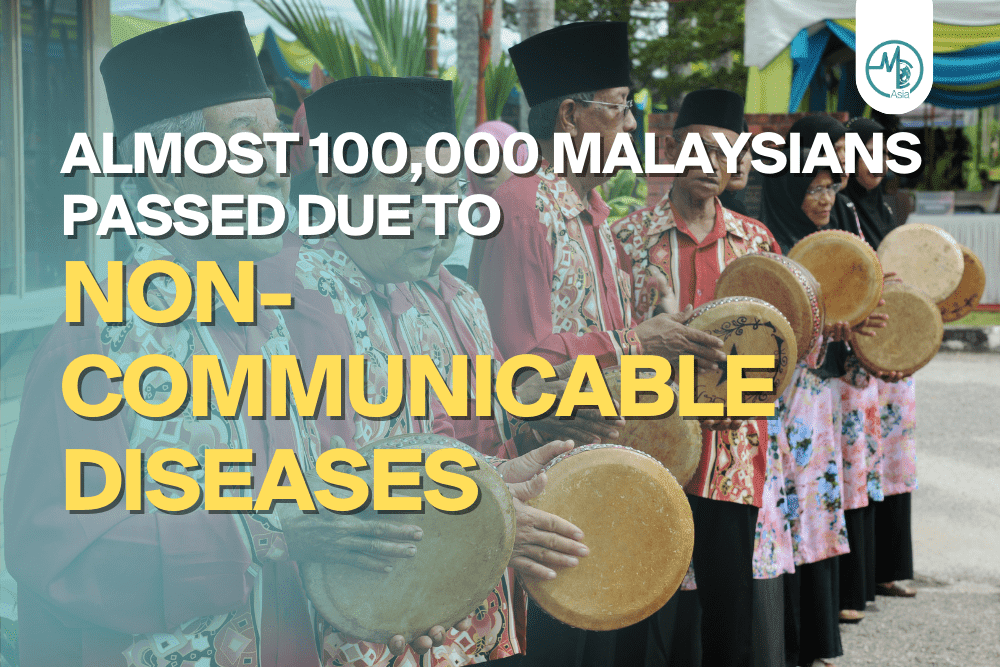In a concerning statistic emerging from Malaysia, almost 100,000 individuals succumbed prematurely to various non-communicable diseases (NCDs) in 2022, falling short of the national average life expectancy of 75 years.
The primary culprits behind these early deaths by NCDs were heart and cerebrovascular diseases, along with pneumonia, underscoring a pressing health crisis in the country.
The Burden of Non-Communicable Diseases
NCDs, also known as chronic diseases, are not passed from person to person and typically progress slowly. The most common types include heart disease, stroke, cancer, and diabetes, among others. These diseases are often associated with lifestyle factors such as diet, exercise, and tobacco use, but can also be influenced by genetic, physiological, and environmental factors.
Leading Causes of Premature Death
The report highlights heart disease and cerebrovascular diseases, which relate to blood flow issues in the brain, as leading causes of premature death among Malaysians. Pneumonia, an acute respiratory condition, was also noted as a significant factor. These conditions are particularly concerning because they are largely preventable through lifestyle changes and access to timely medical care.
Heart Diseases
Heart diseases, often related to unhealthy lifestyle choices and genetic predispositions, continue to be a leading health threat. Factors such as high blood pressure, cholesterol, smoking, and diabetes significantly contribute to the development of cardiac conditions.
Cerebrovascular Diseases
Cerebrovascular diseases, including stroke, are major health concerns that affect the blood vessels and blood supply to the brain. These conditions can lead to significant mortality and long-term disability.
Pneumonia
Pneumonia, although often treatable, can be deadly, especially in vulnerable populations such as the elderly or those with compromised immune systems. The disease’s impact indicates the need for improved access to vaccines, healthcare facilities, and awareness about preventive measures.
Addressing the NCD Crisis
The alarming rate of premature deaths due to NCDs calls for a concerted effort from both the government and the public. Strategies to combat this issue include:
- Promoting Healthy Lifestyles: Encouraging regular exercise, a balanced diet, and cessation of smoking can significantly reduce the risk of NCDs.
- Improving Healthcare Access: Ensuring that all Malaysians have access to quality healthcare services for the prevention and treatment of NCDs.
- Raising Awareness: Educating the public about the risks and prevention of NCDs is crucial in mitigating the impact of these diseases.
- Implementing Policies: The government can play a pivotal role by implementing policies aimed at reducing risk factors associated with NCDs, such as regulating tobacco and unhealthy foods.
Why More People Are Succumbing To NCDs
Dr. Moy Foong Ming from University Malaya’s medical faculty stated that more efforts are necessary to address the severity of the situation with NCDs as the incidence of premature deaths have been less than desirable for the past seven years.
Dr. Moy explained that cardiovascular disease and cerebrovascular disease are closely linked to lifestyle choices. She also emphasised the increase in obesity, high blood pressure and diabetes among Malaysians, quoting the National Health and Morbidity Survey results in recent years.
According to the NHMS 2019, obesity and diabetes rose from 15.% to 19.7% and 11.2% to 18.3% respectively. The same survey reported that one in four Malaysians are not physically active.
The Malaysian Medical Association (MMA) voices concern
The MMA has called on Malaysians to prioritise and be proactive in taking care of their health in 2024. Dr. Azizan Abdul Aziz, the current MMA president, stated that many Malaysians are not paying enough attention to their health. She urged fellow Malaysians to go for regular medical check ups, exercise regularly, and eat healthy to reduce the risk of getting NCDs.
Dr. Azizan mentioned that only a small percentage of Malaysians get regular health check-ups and those living in urban areas need to be aware of their stress levels besides improving their sleeping habits. She also advised Malaysians to quit smoking and be more mindful of their weight.
Doctor’s Insight
Dr. Moy stated that the Malaysian healthcare system would be burdened even more than it already is if Malaysia’s prevalence in NCDs continues to persist/worsen. This will negatively impact the Malaysian economy as the government will need to provide more in terms of funding and facilities to treat additional patients.
This is made worse by the fact that many young Malaysians are developing NCDs at a productive, working age and this would definitely affect the nation’s productivity in the long run. Malaysia spends approximately RM10 billion on treating NCDs, an estimated 16.8% of the nation’s total healthcare expenditure.
Dr. Moy advised fellow Malaysians to take responsibility for their own health and improve them where necessary. While efforts are being made by the government to improve awareness regarding NCDs, Malaysians need to be more proactive when it comes to taking care of their health. She also stated that the local government development ministry should consider the availability of parks for residents to engage in physical activity.
Conclusion
The premature deaths of nearly 100,000 Malaysians due to NCDs in 2022 highlight a critical public health issue. It is imperative for health authorities, policymakers, and individuals to recognise the severity of NCDs and take action towards reducing their impact. By adopting healthier lifestyles, improving healthcare access, and implementing effective health policies, Malaysia can move towards reducing premature deaths and enhancing the quality of life for its citizens.

